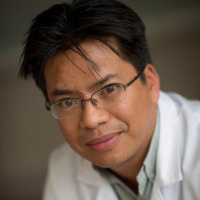Dr. Thai Nguyen-Tang is a specialist in gastroenterology and hepatology FMH. He has been part of the Centre for Gastroenterology and Digestive Endoscopy at Hirslanden Clinique La Colline since 2012 and is also an active doctor at the Centre for Digestive Diseases at Cliniques la Colline and Les Grangettes. On the occasion of Mars Bleu, colorectal cancer awareness month, he shares his expertise on this subject and answers our 3 questions.
Why did you choose to be a doctor and specialize in gastroenterology?
The human body is fascinating and complex, the more we study it, the more there is to understand. The specialty of gastroenterology has the particularity of being very broad and includes the study of the digestive tract, liver and pancreas. I started my training as a surgeon and then I decided to change my orientation to train specifically in endoscopic procedures. The use of endoscopes through natural orifices does not require an incision and allows diagnostic and therapeutic interventions to be performed that are sometimes very complex.
A 2-year post-graduate training in the United States, in California (Los Angeles and San Francisco), allowed me to specialize in two specific techniques: endoscopic interventions on the bile ducts and pancreatic ducts as well as endoscopic ultrasound which allows to examine precisely from inside the body the different organs by a miniaturized ultrasound probe located at the end of the endoscope. Lesions as small as 5 mm can be detected and removed for diagnosis.
How, concretely, does your work influence your everyday life?
Medicine offers ever more complex interventions and we must, with the increase in life expectancy, take care of older and older patients with sometimes many comorbidities. My practice in three different locations in one week (office, private clinic and teaching hospital) is sometimes an organizational challenge. However, it makes it possible to customize the patient's management environment according to his comorbidities and the type of intervention planned. The objective is to ensure both comfort and the best environment to perform the examination.
Participation in multidisciplinary meetings such as those offered by the Center for Digestive Diseases is a key element in the management of sometimes complex situations of some patients. It is a time when different specialists share their opinions on a file according to their angle of vision specific to their specialty and allow concerted medical decisions in line with current practice.
What is your biggest challenge in your profession?
Colorectal cancer is the 2nd most common cancer in the population after breast cancer in women and prostate cancer in men. Polyps are growths in the colon and are present in 40% of individuals. Cantonal screening programmes have started and will make it possible in the future, with the early detection of polyps and their removal, to reduce the incidence of colon cancer in our country. The big challenge is to inform the population on a large scale, and then to provide patients with examinations with the highest standards of detection and safety for the resection of these polyps.
Interview by Julie Landaut.
Dr. Thai Nguyen-Tang



